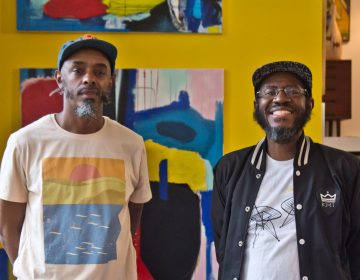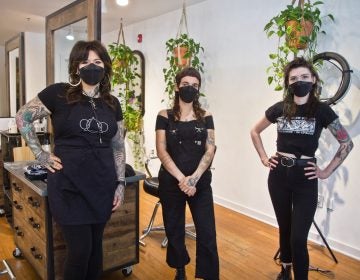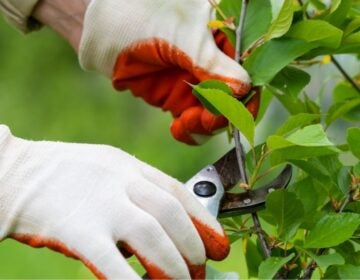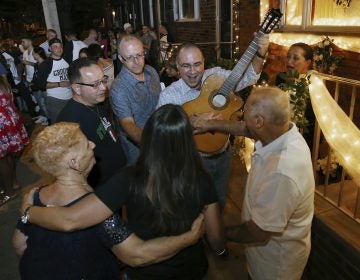Wedding plans? Who could plan? What the pandemic taught us about tying the knot
As coronavirus cases decrease and vaccination rates continue to grow, weddings — as we knew them pre-pandemic — are starting to make a comeback.
Listen 4:10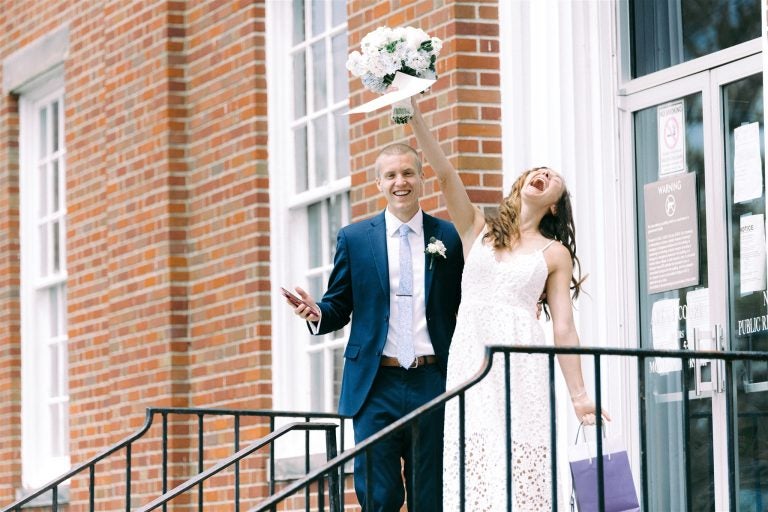
Laura Even and Brian Elliott were married at an Ohio courthouse in May 2020. After having to reschedule their large wedding celebration three times, they had their big event with friends and family on May 29, 2021. (Brittany Bays Photography)
As medical professionals, Brian Elliott and Laura Even knew COVID-19 was serious before most Americans, as early as February 2020.
But like many others, when the coronavirus hit the East Coast and shutdowns began in the region in mid-March, they thought it would be just two weeks.
The couple — originally from the Philly suburbs, but currently completing their medical residencies in Cincinnati — had their wedding date scheduled for early May 2020. They thought, maybe, they’d have to cut their guest list down, possibly push the date back a few weeks or reschedule their honeymoon.
“It was really our wedding planner who was like, ‘I know you don’t want to think about this, but I think we have to think about Plan B,” said Even, a pediatrician originally from Blue Bell, Pennsylvania.
“And so we’re like, ‘Alright it’s fine. We’ll just push it back to June. Everything will be fine by June.’ It was not fine by June,” she said with a laugh.
The pandemic upended the billion-dollar wedding and events industry, bringing many large-scale celebrations to an abrupt halt. For engaged couples, it meant putting all their faith into vendors and venues to be amenable, while businesses struggled to find economic lifelines amid a world where hospitality and entertainment were canceled for an undetermined period.
Now, as coronavirus cases in the United States begin to decrease and vaccination rates continue to grow, weddings — as we knew them pre-pandemic — are starting to make a comeback. But for how long, and which COVID-era wedding traditions will stay or go, remains to be seen
When planning becomes impossible
Elliott and Even — who met while in medical school at Jefferson University — got engaged in June 2018. Their original wedding date was May 2, 2020, then June 24, 2020.
With all the pushbacks and uncertainty, they decided to get married at their local courthouse in Ohio on May 14, 2020. But the plan remained, like many pandemic wedding couples, to still have their celebration and reception at the John James Audubon Center in Montgomery County, with their final rescheduled date on May 29, 2021.
Due to capacity restrictions, one of the biggest changes to their wedding plans was how many people they could invite. At first, they planned to invite 250 people but it was then cut to 112 people, following Pennsylvania’s mandate for event sizing at the time that maxed out at 150 attendees.
The constant change of capacity limits turned planning a wedding into a guessing game, trying to determine how many people they could invite and who they would have to nix from the list. It also meant lots of postage: the couple sent out four different RSVP and invitation notices over the course of the pandemic.
“We had to try and predict essentially what was going to happen because when we were planning the third wedding date … only 50 people were allowed in one room at a time and things were starting to get better. At that point, the vaccine was just coming out,” Elliott said. “So we had to say, ‘OK, maybe around this time it’ll be more people,’ but we basically had to wait to send out the final [RSVP].”
Another big stressor was coordinating with their vendors to make sure they could all reconvene together — the venue, the caterers, the florists — on the exact same date.
Working with the vendors, however, fell on the couple’s wedding planner Jaclyn Fisher of Two Little Birds Planning.
Fisher, based in Philadelphia, normally plans 10-15 weddings per year. And in March, when it became clear that a two-week shutdown to flatten the curve wasn’t going to work, she knew that April and May weddings weren’t going to happen. As state and local guidelines canceling all events were announced, she knew she had to work fast. Several days later, she worked with all of her couples who had upcoming weddings to reschedule for a later date.
“By the end of April, I knew if 2020 weddings were going to take place, they were going to be a lot different,” Fisher said.
For Fisher’s clients scheduled to get married in 2020, she planned two weddings for them: a “micro wedding” in 2020 with immediate family, and then a 2021 or 2022 celebration or vow renewal with all of their family and friends.
And as summer 2020 saw a dip in COVID cases and some eased restrictions, the “micro weddings” grew in size too. One backyard wedding over the summer Fisher planned had 55 people in attendance.
For couples who got engaged during the pandemic, there was plenty of unpredictability too. Jenea Robinson, owner of Marsh + Mane, a natural beauty supply store in Society Hill, and her partner Kenneth Dean got engaged in July 2020.
In the thick of all the cancellations and postponements, it was difficult to even find a date. Originally, they decided on just having an outdoor wedding ceremony at Franklin Square with 50 of their closest friends and family, to keep in line with the event restrictions at the time.
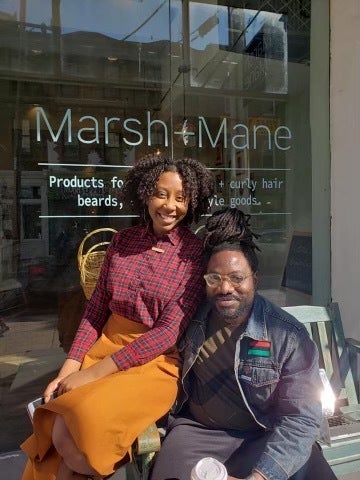
“It has not been fun,” said Robinson of COVID-era wedding planning. “As women, we do think about our wedding and what it will be like. … So having to forgo a lot of those dreams and ideas and things that we wanted, has been really hard. I know it’s been hard for a lot of brides.”
But as the vaccine rolled out and more of their loved ones got their shots, they realized having an outdoor reception was still a possibility. In early 2021, they reserved a spot on June 18 at Bartram’s Garden for their ceremony, followed by a reception at Franklin Square.
The couple was also able to increase their guest list to 90 people. Even with the pandemic waning, Robinson said there will still be several COVID precautions in place, including requiring guests to have negative COVID tests within 24 hours of the wedding, taking temperatures at the event, and having guests who aren’t fully vaccinated wear masks when they aren’t eating.
And for Robinson, it’s not lost on her that for many of her guests, the wedding will be their first party in over a year. It’s made all the more special by the fact that her relatives, many of who live in her home state of Connecticut, will be able to attend because they’re vaccinated.
“It makes us feel better because now we can have something that closely resembles the wedding that we always wanted, and that was just to have our friends and family together to celebrate with us,” she said. “And especially for me, because my family is not from Philadelphia, everyone has to travel in, that would not have been possible if people weren’t able to get vaccinated.”
In her wedding planner role, Fisher also helped couples weigh the risks of their event and figure out what types of precautions to implement to keep their guests safe. Many of them were innovative for the industry.
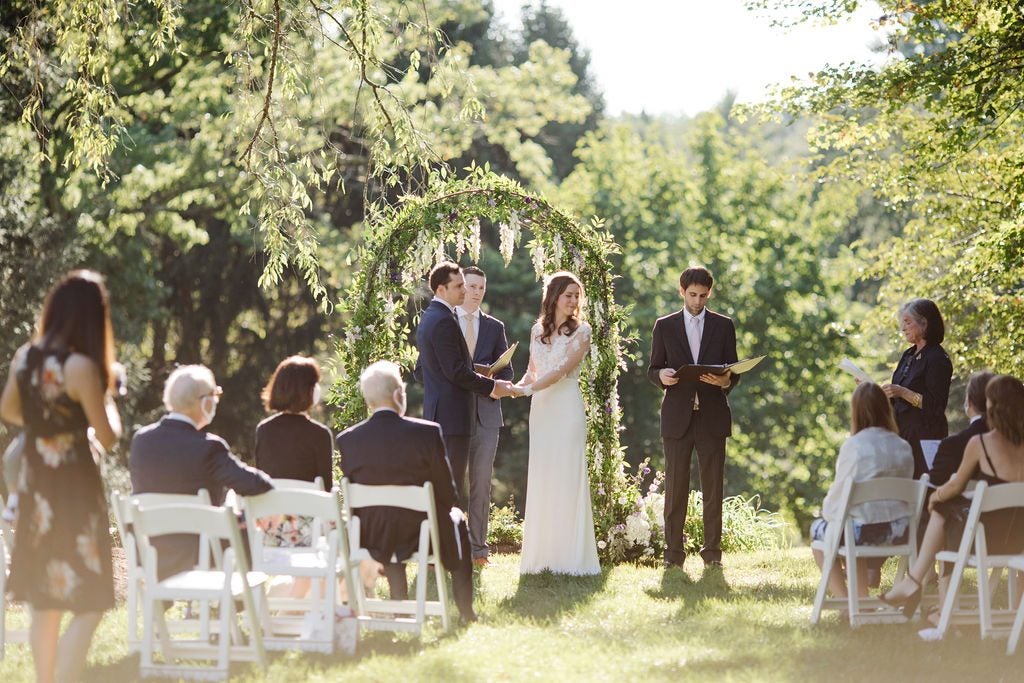
“For example, seating guests by household, distancing the tables, having sanitation stations with masks and sanitizer, and even having bracelets so guests can communicate their comfort level,” Fisher said. “So green [bracelets] meaning hugs are OK, yellow means fistbumps only, and red meaning please keep your distance.”
For Kate Conaway, who is the director of sales and event planning for New Hope-based Jamie Hollander Catering & Events, it was about being transparent and flexible with their clients who were experiencing stress similar to hers and unsure of their financial future.
The company, which manages three wedding venues in the Philadelphia region, decided to do things like loosening their deposit process, where instead of a couple depositing 30% prior to the event, they’d deposit 10%, or offering to reimburse the clients for guests who end up not coming.
“The point was not to make it punitive for people,” Conaway said. “You want to keep people engaged. You want to keep them involved and feeling good about your company. You want to keep them committed to the sites.”
Since Philly dropped its capacity-related restrictions on June 2, Fisher said it’s a “relief” for her couples who had planned weddings in the city for later in the summer and were stressing about their guest count.
She found scheduling difficult as the surrounding suburban counties had different — often less-stringent — guidelines than Philadelphia.
“It’s just been a waiting game and one of the hardest parts is not knowing,” Fisher said. “It’s really hard [to plan] when we don’t have answers and don’t really know what to expect.”
In terms of the big-picture impact on the industry, Fisher said that many people might notice on their calendars that the remainder of 2021 and 2022 are jam-packed with weddings.
“We haven’t heard 2023 yet but I wouldn’t be surprised if we start to see couples planning that far in advance just because of availability for vendors and venues,” she said.
Also expect to see more Friday weddings, as well as outdoor and at-home ceremonies and receptions in the coming years.
“There’s something really special about the bride getting ready at home and coming down her steps to see her dad for the first time and having all of the family portraits in the backyard,” Fisher said. “There’s something really special about that and I love that.”
Celebrating a return to normal?
Elliott and Even ended up tying the knot at their local courthouse last May, as it became more clear that their big celebration would be postponed indefinitely.
As cheesy as it sounds, Even says, she and her husband were tired of not being married and were ready to move through their life milestones despite COVID-19.
And that they did. Their wedding wasn’t exactly as they pictured it before the pandemic, as there was an addition to the bridal party: their 2-month-old son Chase.
Both of them said celebrating their wedding also felt like commemorating a return to normal.
“It’s our wedding, but it’s also the first time people will get to meet our son,” Even said. “It’s not the end, it’s not over, but there’s definitely a lot to look forward to. It’s about us, but it’s also about celebrating that we’re all able to get together again.”
In addition to learning about themselves as a couple — that their partnership can withstand being stuck in an apartment together for months alone, having a baby, and replanning a wedding three times — they also learned a lot about themselves individually.
“I learned that it’s really OK if things don’t go exactly according to plan,” Even said. “Like this is not what we pictured, having our wedding a year after we were legally married with our 2-month-old son there. None of this is what we pictured. But it’s our story and it’s weirdly wonderful.”

Get daily updates from WHYY News!
WHYY is your source for fact-based, in-depth journalism and information. As a nonprofit organization, we rely on financial support from readers like you. Please give today.


